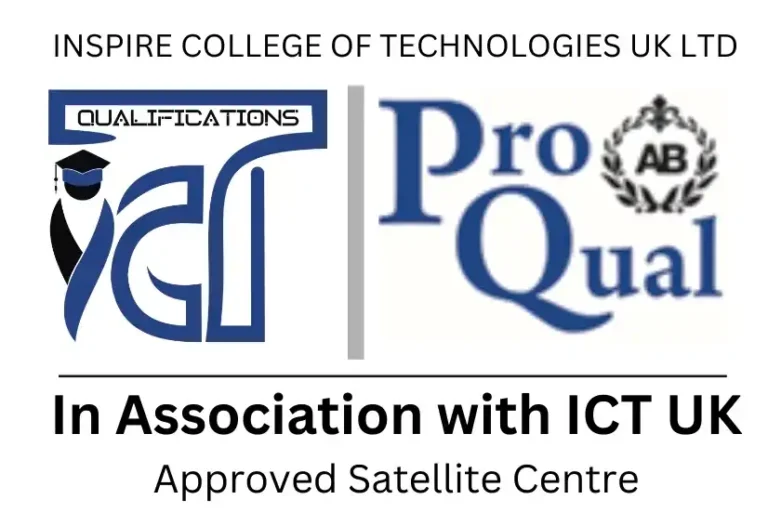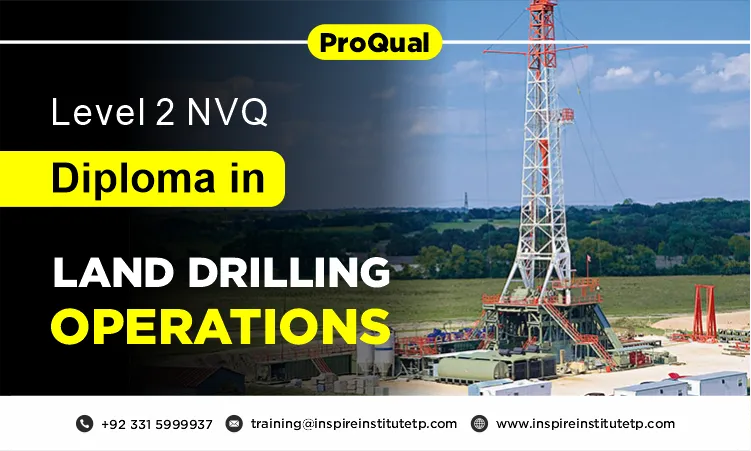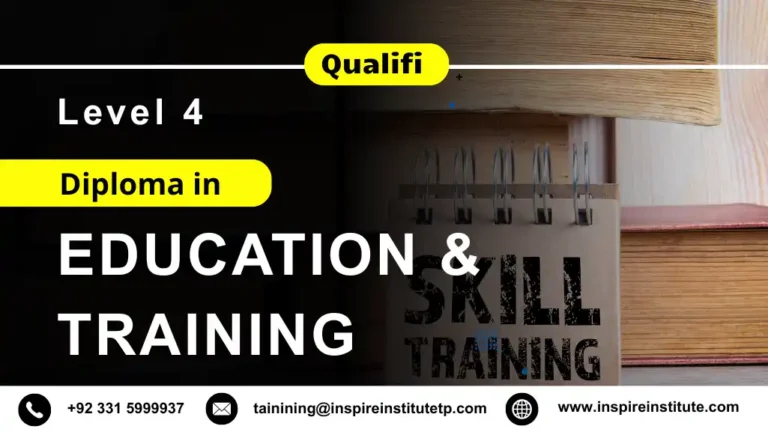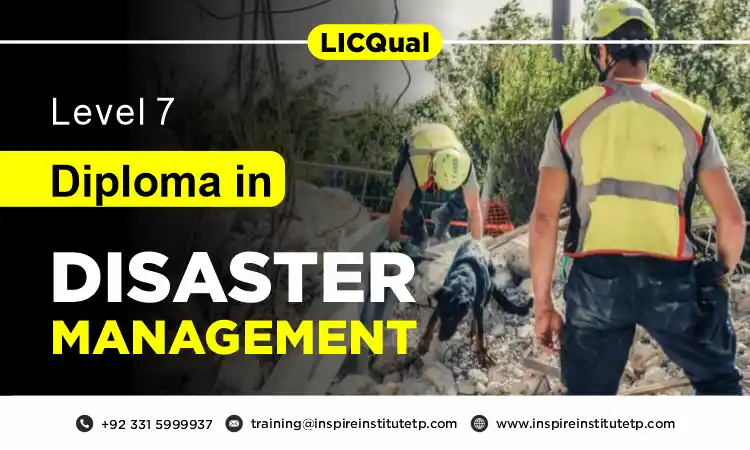ProQual Level 2 NVQ Diploma in Land Drilling Operations
In today’s rapidly evolving construction and engineering sectors, specialized skills are in high demand. One qualification that stands out for those interested in the drilling industry is the ProQual Level 2 NVQ Diploma in Land Drilling Operations. This diploma not only enhances your practical abilities but also opens doors to various career opportunities in land drilling and associated fields. The ProQual Level 2 NVQ Diploma in Land Drilling Operations is designed for individuals working in or aspiring to enter the land drilling sector. This qualification focuses on developing key competencies needed to operate drilling equipment safely and effectively. Candidates will learn about the principles of land drilling, equipment operation, health and safety regulations, and environmental considerations, making this diploma an essential credential for aspiring drilling professionals. The ProQual Level 2 NVQ Diploma in Land Drilling Operations is an excellent investment for anyone looking to establish or advance their career in the drilling sector. With its comprehensive curriculum and focus on essential skills, this qualification not only enhances employability but also prepares individuals for the complexities of modern land drilling operations. By choosing to pursue this diploma, you are taking a significant step toward achieving your professional aspirations in a dynamic and growing field.
Why Choose this Qualification
Choosing the ProQual Level 2 NVQ Diploma in Land Drilling Operations can significantly enhance your career prospects in the drilling industry. This qualification is specifically tailored to provide individuals with essential skills and knowledge crucial for success in this specialized field.
The diploma offers a comprehensive understanding of land drilling operations, covering key aspects such as equipment operation, site safety, and environmental considerations. This foundational knowledge is critical for anyone looking to excel in drilling roles.
The course is designed with a practical focus, allowing you to apply theoretical knowledge in real-world scenarios. This hands-on experience is invaluable, as it prepares you to perform effectively on-site and increases your confidence in operating drilling equipment safely.
The ProQual Level 2 NVQ Diploma in Land Drilling Operations is an excellent choice for anyone serious about pursuing a career in the drilling industry. With its emphasis on practical skills, industry recognition, and potential for career advancement, this qualification is a vital asset for aspiring professionals in the field.
Course Overview
Ofqual Regulated Qualification
Course Level: Level 2
Average Completion Time:
4-12 Months
Required Credits: Minimum of 53 Credits
Evidence & Assignment Based

Inspire Institute of Technologies is Approved Satellite Centre of ProQual
Qualification Structure
The ProQual Level 2 NVQ Diploma in Land Drilling Operations, to achieve the qualification candidates must achieve a minimum of 53 credits (Total qualification time 570 hours):
- 29 credits from the Mandatory units, plus
- a minimum of 24 credits from one pathway in Group B;
- Candidates may choose to do any of the Additional units from Group C but they will not count towards qualification.
Mandatory Units
| Unit Title | Unit Level | Credit Value | GLH |
| Contributing to the Specified Drilling Programme in the Workplace | 2 | 14 | 47 |
| Establishing Work Area Protection and Safety in the Workplace | 2 | 10 | 33 |
| Conforming to General Health, Safety and Welfare in the Workplace | 1 | 2 | 7 |
| Conforming to Productive Working Practices in the Workplace | 2 | 3 | 10 |
Group B Optional Units – candidates must complete 1 pathway
| Pathway 1: Land Driller |
| Pathway 2: Land Driller Support Operative |
Pathway 1: Land Driller – candidates must complete both Mandatory units and one Optional unit
| Unit Title | Unit Level | Credit Value | GLH |
| Providing for and Maintaining the Security of the Work and Environment Surrounding the Drilling Area in the Workplace | 2 | 12 | 40 |
| Drilling and Completing Holes to the Drilling Specification Programme in the Workplace | 2 | 43 | 143 |
Optional Units
| Unit Title | Unit Level | Credit Value | GLH |
| Reinstating Ground Condition in the Workplace | 2 | 12 | 40 |
| Carrying Out Checks and/or Basic Maintenance on Plant or Machinery in the Workplace | 2 | 8 | 27 |
| Preparing and Operating Specialised Powered Tools and Equipment in the Workplace | 2 | 4 | 13 |
| Setting Out Secondary Dimensional Work Control in the Workplace | 2 | 8 | 27 |
| Slinging and Signalling the Movement of Loads (Secondary Role) in the Workplace | 2 | 8 | 27 |
Pathway 2: Land Driller Support Operative – Mandatory units
| Unit Title | Unit Level | Credit Value | GLH |
| Reinstating Ground Condition in the Workplace | 2 | 12 | 40 |
| Carrying Out Checks and/or Basic Maintenance on Plant or Machinery in the Workplace | 2 | 8 | 27 |
One Optional unit
| Unit Title | Unit Level | Credit Value | GLH |
| Receiving and Organising Materials and Equipment for the Drilling Activity in the Workplace | 2 | 9 | 30 |
| Preparing and Operating Specialised Powered Tools and Equipment in the Workplace | 2 | 4 | 13 |
| Setting Out Secondary Dimensional Work Control in the Workplace | 2 | 8 | 27 |
| Slinging and Signalling the Movement of Loads (Secondary Role) in the Workplace | 2 | 8 | 27 |
Group C Optional Units
| Unit Title | Unit Level | Credit Value | GLH |
| Preparing and Operating Overhead Cranes to Lift and Transfer Loads in the Workplace | 2 | 18 | 60 |
| Preparing and Operating Excavator Cranes to Lift and Transfer Loads in the Workplace | 2 | 30 | 100 |
| Preparing and Operating Rough Terrain Masted Forklifts to Lift and Transfer Loads in the Workplace | 2 | 18 | 60 |
| Preparing and Operating Industrial Counterbalanced Forklifts to Lift and Transfer Loads in the Workplace | 2 | 16 | 53 |
| Preparing and Operating Sideloader Forklifts to Lift and Transfer Loads in the Workplace | 2 | 16 | 53 |
| Preparing and Operating Telescopic Handlers to Lift and Transfer Loads in the Workplace | 2 | 25 | 83 |
| Preparing and Operating Reach Trucks to Lift and Transfer Loads in the Workplace | 2 | 16 | 53 |
| Preparing and Operating Lorry Loaders or Knuckle Boom Cranes to Lift and Transfer Loads in the Workplace | 2 | 30 | 100 |
| Preparing and Operating 180 degree Excavators to Extract Ground and Loose Materials in the Workplace | 2 | 80 | 267 |
| Preparing and Operating Skid Steer Loaders to Extract Loose Materials in the Workplace | 2 | 20 | 67 |
| Preparing and Operating Loader Compressors to Extract Loose Materials in the Workplace | 2 | 16 | 53 |
| Preparing and Operating 360 degree Excavators to Extract Ground, Face and/or Loose Materials in the Workplace | 2 | 80 | 267 |
| Preparing and Operating Crawler/Tractor Dozers to Excavate and/or Form Ground in the Workplace | 2 | 85 | 283 |
| Preparing and Operating 360 degree Excavators to Excavate Ground in the Workplace | 2 | 80 | 267 |
| Preparing and Operating Truck-mounted Boom Concrete Pumps to Receive, Pump and Discharge Materials in the Workplace | 2 | 70 | 233 |
| Preparing and Operating Forward Tipping Dumpers to Receive, Transport and Discharge Materials in the Workplace | 2 | 16 | 53 |
| Preparing and Operating Agricultural-based Tractors for Non-agricultural Activities in the Workplace | 2 | 20 | 67 |
| Preparing and Operating Trailer-mounted Concrete Pumps to Receive, Pump and Discharge Materials in the Workplace | 2 | 18 | 60 |
| Preparing and Operating Self-propelled Bowsers to Receive, Transport and Discharge Materials in the Workplace | 2 | 12 | 40 |
Who Should Take This Course
The ProQual Level 2 NVQ Diploma in Land Drilling Operations is designed for a variety of individuals within the drilling industry. Here are the key groups who would benefit from this qualification:
- Current Land Drilling Professionals: Individuals already working in drilling roles looking to formalize their skills and knowledge. This diploma enhances their practical capabilities and industry understanding.
- Aspiring Drillers: Those aiming to enter the land drilling sector who want to gain essential skills and a recognized qualification that can help them secure employment.
- Site Supervisors: Individuals in supervisory roles who need to deepen their understanding of drilling operations, safety protocols, and equipment management to effectively lead teams.
- Construction Workers: Workers in related construction fields who wish to diversify their skills by specializing in land drilling operations.
- Health and Safety Personnel: Professionals focused on safety regulations in the drilling environment who want to better understand the operational aspects of land drilling.
- Career Changers: Individuals looking to transition into the drilling industry from other sectors who need foundational knowledge and practical training.
This diploma is suitable for anyone eager to enhance their qualifications and advance their careers in land drilling operations. It provides the essential skills and knowledge needed to thrive in this dynamic and evolving industry.
Course Benefits
The ProQual Level 2 NVQ Diploma in Land Drilling Operations offers numerous benefits that can significantly enhance your career in the drilling industry. Here are some key advantages of pursuing this qualification:
- Industry Recognition: This diploma is widely recognized within the drilling and construction sectors, enhancing your credibility and employability. Employers value qualifications that demonstrate your commitment to professional development.
- Practical Skills Development: The course emphasizes hands-on training, enabling you to gain practical experience in operating drilling equipment, understanding site procedures, and implementing safety measures. This practical focus prepares you for real-world challenges on the job.
- Career Advancement Opportunities: Obtaining this diploma can open doors to more advanced roles within the drilling sector, such as supervisory or specialized positions. It provides a solid foundation for further qualifications and career progression.
- Comprehensive Knowledge Base: The curriculum covers essential topics, including drilling techniques, health and safety regulations, and environmental considerations. This comprehensive knowledge is crucial for effective decision-making in drilling operations.
- Enhanced Employability: By acquiring a recognized qualification, you improve your marketability to potential employers. The skills and knowledge gained from this diploma can set you apart from other candidates in a competitive job market.
- Networking Opportunities: Enrolling in this course allows you to connect with industry professionals and fellow learners, providing valuable networking opportunities that can benefit your career.
- Foundation for Lifelong Learning: This qualification lays the groundwork for continuous professional development. It encourages ongoing learning and adaptation to new technologies and methods in the drilling industry.
The ProQual Level 2 NVQ Diploma in Land Drilling Operations is an excellent investment for anyone looking to build a successful career in the drilling field. Its combination of practical skills, industry recognition, and career advancement potential makes it a valuable credential for aspiring professionals.
Eligibility Criteria
By ensuring these steps are taken, candidates can better prepare for the qualification and maximize their learning experience.
1. Age Requirement
Candidates must be at least 16 years old.
2. Educational Background
A minimum of GCSEs (or equivalent) in English and Mathematics is preferred, as these skills are essential for understanding course content and completing assessments.
3. Work Experience
While prior experience in land drilling or a related field is beneficial, it is not mandatory. However, candidates should have some exposure to the construction or engineering sectors to better understand the context of the training.
4. Language Proficiency
Proficiency in English is necessary for effective communication and comprehension of course materials. Non-native speakers may need to demonstrate their language skills through an assessment.
5. Commitment to Learning
Candidates should demonstrate a genuine interest in pursuing a career in land drilling operations and a commitment to completing the course requirements.
The Qualification Process
Here is a step-by-step guide to help you understand the entire journey from pre-registration to certification:
- Self-Assessment:
Begin by evaluating your eligibility for the course. Ensure you meet the entry requirements, such as relevant qualifications or professional experience, as outlined for the program. - Registration:
Complete your registration by submitting the required documents, including a scanned copy of a valid ID, and pay the necessary registration fee. This is your first official step in the qualification process. - Induction:
An assessor will conduct an induction session to verify your eligibility and introduce you to the evidence requirements. During this stage:- If the assessor finds that you meet all the necessary criteria, you will proceed to the next step.
- If you do not meet the entry requirements, your registration will be canceled, and your fee will be refunded.
- Evidence Submission:
Based on the assessment criteria, you will need to submit evidence demonstrating your knowledge and competence. Consult with your assessor if you need clarification on the type and nature of the evidence required. This evidence could include assignments, projects, case studies, or professional experiences related to sustainability management. - Feedback and Revision:
The assessor will review your submitted evidence and provide feedback. Evidence that meets the required criteria will be marked as “criteria met.” If there are any gaps, the assessor will highlight them, and you will need to address those gaps by revising and resubmitting the evidence. - Competence Evidence:
Submit your final evidence demonstrating that you have successfully achieved all the learning outcomes. The assessor will mark your submission as “Criteria met” once everything is up to standard. - Internal Quality Assurance (IQA):
After your evidence is approved by the assessor, the Internal Quality Assurance Verifier (IQA) will review it to ensure that the assessment was carried out consistently and according to ProQual standards. - External Verification:
The IQA then presents your portfolio to ProQual External Quality Assurance Verifiers (EQA) for final confirmation. The EQA may contact you directly to verify the authenticity of your evidence. - Certification:
Once all internal and external checks are completed to satisfaction, ProQual will issue your official certificate, confirming that you have successfully achieved the qualification.
This comprehensive process ensures that learners demonstrate all necessary competencies and meet the high standards required for the ProQual Level 2 Diploma in Construction Operations (Construction)







